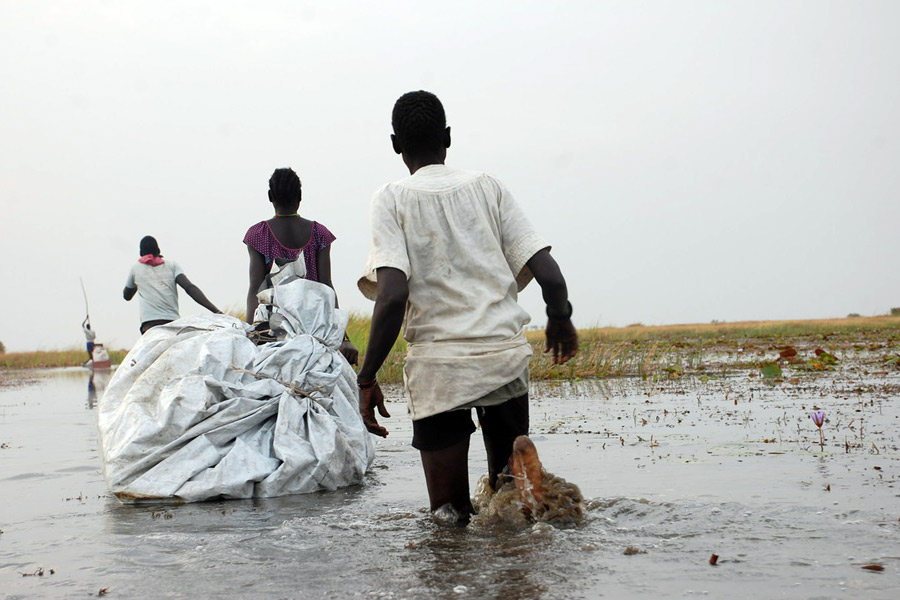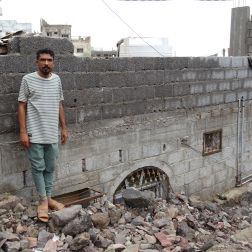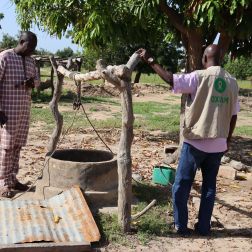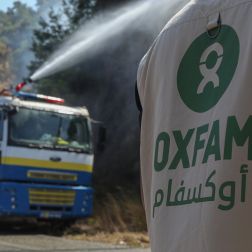- 4 mins read time
- Published: 20th April 2017
Famine in South Sudan: communities at breaking point
In South Sudan, the violent and brutal war has put millions at risk. Women, men and children who have fled their homes in search of safety are now facing a new threat - hunger. With harvests still months away, the famine already declared in parts of the country will spread across the rest of the country, unless we act now.

Majok at the WFP registration site in Nyal. He had to make a one and half hours trek, helped by family members, from his home to Nyal to ensure he was physically present for the registration. Photo: Bruno Bierrenbach Feder/Oxfam
In South Sudan, the violent and brutal war has put millions at risk. Women, men and children who have fled their homes in search of safety are now facing a new threat - hunger. With harvests still months away, the famine already declared in parts of the country will spread across the rest of the country, unless we act now.
When the rains begin in late April or May, conditions will become even more difficult for the people in need and for the humanitarian groups trying to reach them. Flooding makes roads and airstrips impassable and can cause a rise in cholera and other water-borne diseases.

George* sits on his mother’s lap as health personnel takes his measurements to determine his nutrition level. There are 208 malnutrition cases in this hospital in Nyal, Unity State. These don't include the many adults facing extreme hunger in the area.
Nearly 5 million people - 40 percent of the population - are facing extreme hunger. "We are seeing communities now at breaking point. In the swamps between the famine-affected areas and where Oxfam is working, we know that there are thousands of people going desperately hungry,” says Dorothy Sang, Oxfam's Humanitarian Campaign Manager in South Sudan.
Panjiyar County, in southern Unity State, sits next to the frontline of some of the heaviest fighting we are seeing in South Sudan today. It is no coincidence that this frontline is also home to the 100,000 people who have been hit by deadly famine. Many have traveled for days on foot to reach generous host communities, who themselves are now sharing what little food they have with their neighbours and are waiting for that next food aid delivery in order to survive.

An elderly woman at the registration site in Nyal Catholic church, South Sudan. She came from Nyandong Payam with the help of family members. Photo: Bruno Bierrenbach Feder/Oxfam
So far, Oxfam and other humanitarian organisations have been able to help to keep famine from spreading with food distributions, clean water and other vital aid. So far, we have been distributing food to more than 415,000 people as well as providing more than 140,000 people with clean water and sanitation services.

Oxfam staff Pedro Marial Rock takes the fingerprint signatures of Nyabiey (left) and Nyakonga (right) to verify they are receiving food at a distribution in Nyal on March 20, 2017. Photo: Lauren Hartnett/Oxfam
In Nyal, Panyijar County, some of the most vulnerable people from surrounding islands arrive exhausted after hours on Oxfam canoes. They are here to register for a World Food Programme food distribution. We are using canoes and paying canoe operators to make sure that the most vulnerable do not miss out on access to food.

Marissa and her family fled from famine and conflict-hit Mayendit, where all of their food had been burnt and their home burnt down. They brought what they still had to Nyal, pulling their possessions along the swamps in large tarpaulins. They're now hoping to register for a food drop. Photo: Dorothy Sang/Oxfam
Besides providing clean water and toilets on some of the islands closest to Nyal, we are also helping both its island and mainland communities to set up vegetable gardens to boost their own diets and to build up their livelihoods.
“What concerns us most are the people we have yet to reach. The fighting means no one is able to work on the remote islands, and we are only able to send canoes up the river to help the people when we can ensure the safety of our staff,” says Sang.
The people of South Sudan are doing all they can to help themselves. Where the newly displaced have arrived, families are generously offering what little they have. But this is not enough. We need to get more food, clean water and other vital support to the most vulnerable people.
We are calling for more funding to help reach people before it’s too late. You can help. Donate now.




